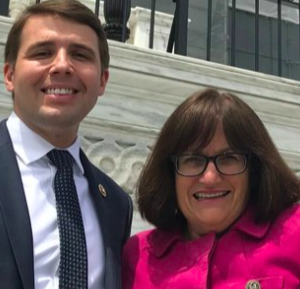After days of defending the Biden administration’s IRS reporting program impacting middle-class families, New Hampshire Democrats Reps. Chris Pappas and Annie Kuster reversed course Thursday. They joined a group of 21 House Democrats in a letter to leadership asking the policy be abandoned.
The provision would have allowed the IRS to get data from banks on all private accounts with $600 in total activity per year. After pushback from the banking industry and the general public, congressional Democrats announced they were raising the threshold to $10,000 annually.
That appeared to appease Kuster and Pappas, who expressed their support for the policy using the new number. But it didn’t appease opponents like the New Hampshire Banking Association or other Granite State business groups. They released a letter Monday repeating their opposition, regardless of the threshold.
“This overly intrusive proposal would impact virtually every Granite Stater with a bank account and violate their fundamental privacy rights,” N.H. Bankers Association President Kristie Merrill said.
With polls showing the policy wildly unpopular and key business leaders back home speaking out against it, the two New Hampshire Democrats cried ‘No mas!’
“While I strongly support efforts to ensure that the wealthiest 1% of Americans pay their fair share, the current proposal is overly broad and would sweep up sensitive financial information from middle-class Granite Staters,” Kuster said.
Pappas did not issue his own statement but quoted from the letter he and his fellow House Democrats signed.
“Given the privacy concerns this raises in addition to the significant burden that would be imposed on a broad range of businesses and financial institutions, we respectfully request that this proposal not be included in the Build Back Better package,” the letter states.
Merrill thanked both Pappas and Kuster for their opposition, as did other New Hampshire financial service professionals.
A. Scott MacKnight, CEO and president of Triangle Credit Union, said his customers deserve to know their information will be safe from intrusive government searches.
“Credit union members expect us to safeguard their financial information and this proposal would make it difficult to meet their expectations.”
Denise Barstow, president and CEO of Granite State Credit Union, said his 40,000 members have been worried about their accounts under the proposal.
“Members are asking what the credit union will do to protect them should this proposal become law. We are very pleased to see and support Congresswoman Kuster as she speaks out in opposition to this rule that would violate the account privacy of New Hampshire residents,” Barlow said.
Now the question is, what is the status of the IRS policy?
The White House posted what it called a “framework” of agreement among Democrats for the so-called “Build Back Better” social spending plan, with a price tag of $1.75 trillion. But a framework isn’t legislation and the bullet points in the Biden administration’s post are unclear.
The White House framework refers to “IRS Investments to Close the Tax Gap” that are supposed to bring in $400 billion in new revenue over the next 10 years. Would the Biden administration get able to get to a number that high without it?
Richard Rubin covers U.S. tax policy for The Wall Street Journal, and he reported it’s not in the current plan. But given that Democrats were unable to reach an agreement as of late Thursday night to move forward on a spending plan, there could still be surprises ahead.




